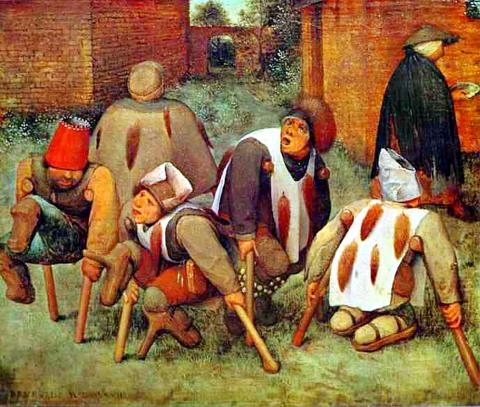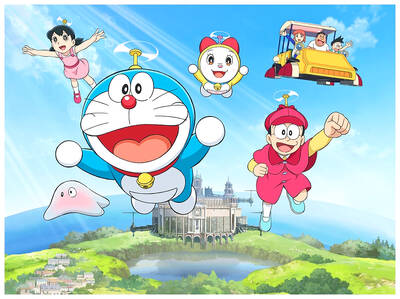Chinese Practice
飢不擇食
(ji1 bu4 ze2 shi2)

Photo: Wikimedia Commons
照片:維基共享資源
when hungry, you can’t pick what you eat
孟子(約西元前三七二~西元前二八九年)是戰國時期儒學家,周遊列國,向各諸侯提出治國的建言。孟子的基本主張是,統治者應該以仁義治國,如此人民便自然而然會擁戴他們。
在《孟子.公孫丑上》中,公孫丑問孟子說,如果孟子有機會掌治理齊國的大權,那是否有機會建立像管仲、晏嬰等賢人古時為齊國所成就的霸業?孟子回答說,雖然統治者長期以來的作為遠不及古代先賢的仁政和德政,但跟這些賢人統治下的齊國相比,孟子時代的齊國有兩點更具優勢:它有更廣闊的領土和更多的財富,以及人民對仁政和德政的渴望,因為人民長期以來一直缺乏這種開明的統治。孟子說:「飢餓易為食,渴望易為飲」,意為「飢腸轆轆的人可以吃下任何東西,口渴的人可以喝下任何東西」。這句話的前半部演變為成語「飢不擇食」,字面意思是「飢餓得不去選擇所吃的食物」。成語「飢不擇食」是用來表達,在艱難或困乏的時候,我們沒有那種奢侈去等待最佳選項出現。
「飢不擇食」這個成語後來出現在施耐庵(約西元一二九六~一三七二年)的《水滸傳》──一般公認為是中國文學四大古典小說之一,其中有一句寫道:「自古有幾般:飢不擇食,寒不擇衣,惶不擇路,貧不擇妻」(自古就有一定的道理:飢餓時不能選擇吃什麼,寒冷時不能選擇穿什麼,情急時不能選擇要走的路,貧窮時不能選擇要娶的妻子)。
英文有一句諺語「beggars can’t be choosers」(乞丐不能當做出選擇的人,或乞丐沒得挑),與「飢不擇食」有明顯的相似處。我們已知這諺語至少有數個世紀的歷史,因其出現在英格蘭作家約翰‧海伍德(約一四九七~一五八○年)的作品中。
海伍德在一五四六年的《英文諺語全集》──我們在先前的「活用成語」單元曾提到過幾次,往後也必會再出現──他寫道:
不,正如常言道,無論是贏家還是輸家
乞丐都沒得挑。
所以如果我阿姨願意給我這個,我會接受;
因為當你什麼都沒有的時候,即使是一點小東西都不無小補
海伍德在另一部作品《三百諺語的三百警句》(此書與前述《英文諺語全集》皆收錄於一五六二年的彙編《約翰‧海伍德之諺語、箴言和雜記》)中,他寫道:
人說乞丐不會是做選擇的人;但他們會選擇去乞討
誰能阻止乞丐去乞討呢?
(台北時報林俐凱譯)
他失業太久了,因為找工作屢屢碰壁,現在飢不擇食,什麼都願意做。
(He’s been unemployed so long, and keeps hitting a wall in his job search. Right now he’s thinking beggars can’t be choosers: he’d be willing to do anything.)
他好不容易回到家,也不管麵包發了霉,便狼吞虎嚥起來,真是飢不擇食。
(At long last he got home, and wolfed the bread down, even though it was moldy: He was desperate for something to eat.)
英文練習
beggars can’t be choosers
Mencius (ca 372–289 BC) was a Warring States period Chinese philosopher in the mold of Confucius (551–479 BC), traveling around offering advice to rulers of states. Mencius’ basic stance was that a ruler should lead by benevolent and just governance, and if they did this, the people would naturally follow them.
In the Gong Sun Chou I chapter of the mengzi (Mencius), he was asked by Gong Sun Chou about whether the state of Qi stood a chance of gaining supremacy over rival states, and achieving what statesmen Guan Zhong and Yanzi had done for the state in the past. Mencius answered that, although contemporary rulers had long fallen short of the standards of benevolence and virtue of the ancient sages, Qi benefitted from two things compared to those sages’ kingdoms: not just more expansive territory and greater wealth, but also the sheer willingness of the people to follow a benevolent, just ruler, as they had been starved of such enlightened rule for so long. According to the Mencius, he said 飢者易為食,渴者易為飲: “The hungry readily partake of any food, and the thirsty of any drink.” The first part of that sentence has come down to us as the idiom 飢不擇食, literally “the starving do not choose their food.” It is used to express the idea that, in trying times, or in times of want, we do not have the luxury of waiting for the best option to come.
The idiom appeared in Shi Nai’an’s (ca. 1296–1372) shuihu zhuan (Water Margin) — widely regarded as one of the Four Great Classical Novels of Chinese literature — in the sentence 自古有幾般:飢不擇食,寒不擇衣,惶不擇路,貧不擇妻 (“From ancient times there have been certain truths: the starving cannot choose what they eat, the cold what they wear, the desperate the road they tread, nor the poor the wife they take”).
In English, we have the proverb “beggars can’t be choosers,” with the obvious similarities with 飢不擇食. We know this proverb to be at least several centuries old, as it appears in the works of the English writer John Heywood (c. 1497 – c. 1580).
In his 1546 collection A dialogue conteinyng the nomber in effect of all the prouerbes in the Englishe tongue — which we have mentioned on several occasions before in Using Idioms, and which we will no doubt have occasion to use again — Heywood writes:
Nay, (quoth I), be they winners or losers,
Folk say alway beggars should be no choosers.
With thanks, I shall take whatever mine aunt please;
Where nothing is, a little thing doth ease.
In another work, Three Hundred Epigrams upon Three Hundred Proverbs — appearing together with the aforementioned collection of proverbs in a 1562 compilation entitled The Proverbs, Epigrams and Miscellanies of John Heywood — he writes:
Beggars should be no choosers; but yet they will;
Who can bring a beggar from choice to beg still?
(Paul Cooper, Taipei Times)
This model has more functions, but we should get the cheaper one. Beggars can’t be choosers.
(這個型號的功能比較多,可是我們應該買便宜一點的。我們預算有限,沒辦法挑三揀四的。)
The chef has gone home. We’ll have to make do with a sandwich. Beggars can’t be choosers.
(廚師下班了,所以只有三明治可以吃,我們沒得挑。)

A: The National Palace Museum (NPM) has launched an exhibition, titled “From Impressionism to Early Modernism.” There are 81 masterpieces from the Metropolitan Museum of Art on display now. B: The exhibit, held to celebrate the NPM’s centennial, must be so spectacular. A: It includes artworks by 38 artists, such as Renoir, van Gogh, Cezanne, Matisse and Gauguin. B: The Fubon Art Museum has also launched an exhibit featuring a number of artworks of Impressionism, including Monet’s “Water Lilies.” A: And the New Taipei City Art Museum just had its grand opening, so there are even more exhibitions

A: What exhibitions are you going to see this summer? B: The 100% Doraemon & Friends exhibit is set to open on June 28. A: The news says there will be a 12-meter-tall giant Doraemon model at the Huashan 1914 Creative Park. B: The One Piece Carnival will set sail on the same day. A: And the D’festa Taipei 2025 – featuring exclusive content from K-pop supergroups such as BTS, NCT and Twice – is also set to begin next Friday. Isn’t that cool? A: 今年夏天還有什麼展覽可看啊? B: 「100%哆啦A夢 & Friends特展」即將在6月28日開幕。 A: 新聞說在華山1914文創園區會場,還有12米高的巨型哆啦A夢呢! B: 航海王「One Piece歡樂派對嘉年華」也將在同日啟航。 A:

The new generation born between 2025 and 2039 has been officially named “Generation Beta,” or simply “Gen Beta.” This generation will be the first to experience a world where artificial intelligence (AI) plays a key role in daily life. Generations are defined by shared cultural, social and historical experiences within a specific time frame. These experiences, often influenced by significant events and technological advancements, shape the values, attitudes and behaviors of each generation. The concept of generations helps us understand how different age groups interact with their environment and contribute to societal changes over time. The previous generational transition from Gen

Continued from yesterday(延續自昨日) https://www.taipeitimes.com/News/lang As Gen Beta grows, they are expected to witness advanced technologies becoming fully integrated into various fields like education, workplaces, healthcare and entertainment. In addition to technological developments, they will also face big challenges like severe climate change. Influenced by their Gen Y or Gen Z parents, who view climate change as a critical issue for the future and prioritize sustainability, they are likely to focus more on global issues and seek innovative solutions to address them. Moreover, Gen Beta will experience considerable demographic changes, such as lower birth rates and longer lifespans. Consequently, Gen Beta is predicted to